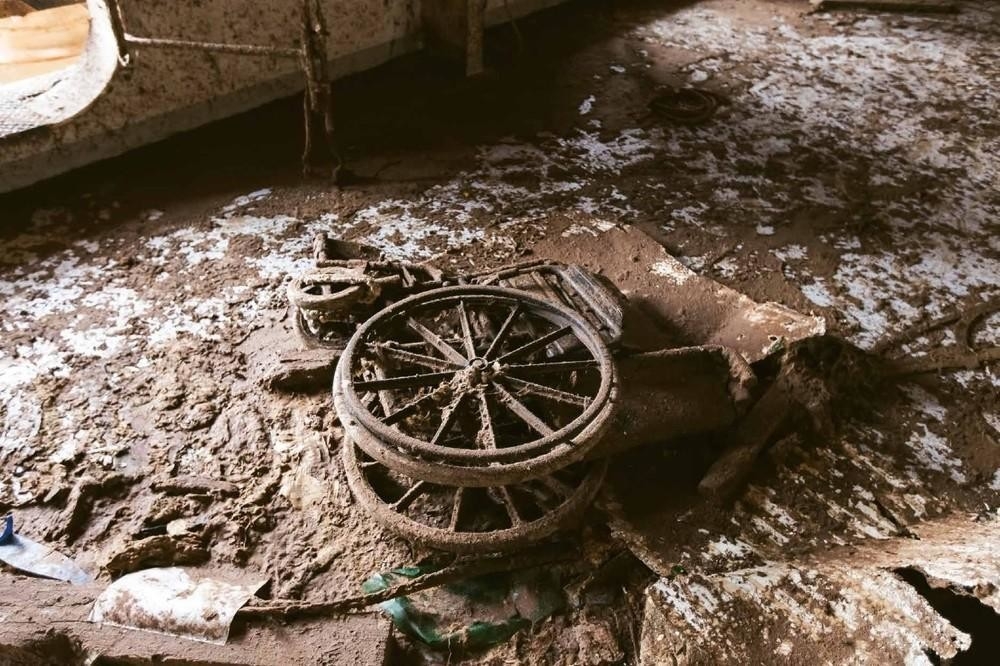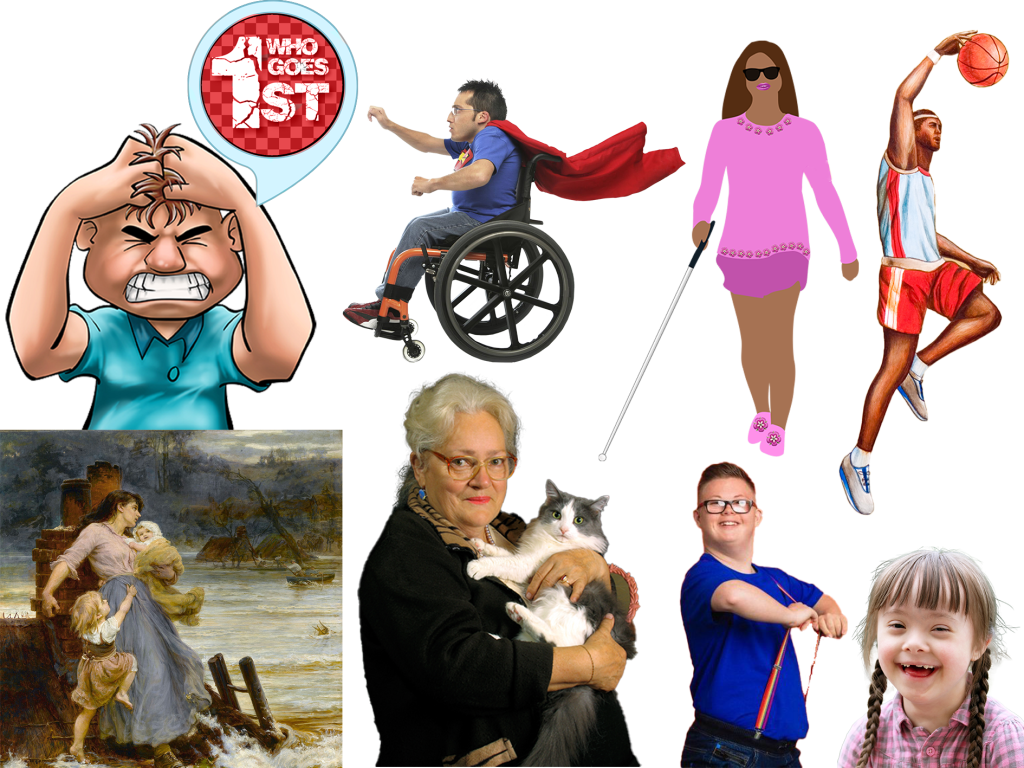Did any wheelchair user have independent egress off the cruise ship that did sink leaving this wheelchair in the muddy slush?
By Maria
We are all human you know… individuals in our own right and collectively without distinction, without placing labels, without differentiating any of us. As part of a civilized human society we all deserve to live with dignity without deprivation, detriment, or fear regardless of our individual status or what our laws of the day say.
The worst result for society is for ‘advantage’ to be misconstrued and accepted as equal access to opportunity. There must be an acknowledgement that discrimination is a vastly different concept to disadvantage, and that service provision seems to be at the forefront of violence, abuse, neglect, and exploitation of people living with body impairments, terminal illnesses, and mature age.
Legal human rights in the real world are nothing but a legal concept of a complaint mechanism process where one person makes a legal complaint against another person. The protection is akin to a warm and fuzzy overcoat covering a naked body.
A job is a job. An exchange of time and action for a reward. A business is in business to make money, why else would it exist? The aim of the business game is to make as much money as possible at the least cost, while appearing to play by the government’s specified business rules, especially if the business revenue is generated via government funding. Not-for-profit organisations are no exception, they can also be ruthless business operators who generate extremely healthy profits. Executive salaries can be dependent on profit performance, legal human rights should not be.
Our perception is our reality. Eutopia is a starting point when you want something that is attainable rather than seeking Utopia, a place too perfect to exist in the reality of our world.
What should we expect to see in a relationship between service provider and person with a body impairment?
? That service providers willing and unfailingly accept responsibility for performing health and welfare checks with the people who rely on them for personal support and as part of that audit ensures each individual has an emergency plan designed to accommodate their circumstances in the case of future service disruption.
? That in the case an individual who requires care from a support worker or carer, they willingly and unfailingly accept responsibility to ensure an emergency plan is ready and actionable in the event they cannot receive care from their regular provider.
? That the health system willingly and unfailingly accepts responsibility in creating unique pathways for each individual if care from an alternative source such as a family member, friend, spouse, or trusted person, is not possible and an individual needs hospital admittance to receive their required care.
“The buck stops with me”. In reality, the acceptance of responsibility, does not ensure the required action is available or performed. In our modern world acceptance of responsibility, especially political responsibility, is a “I’ll fess up and apologise for the failure” cop out that has no obligation consequence attached to it.
You can establish a goal and plan for this, a goal and plan for that, a law, a regulation, fines, gaol sentences, a wall of shame, a wall of fame, a reward medal, monetary incentives, any, or none of these may work with some people in some situations. Motivation comes from within. It is not possible for one to do the right thing if one has no personal motivation to do so. The right thing in one’s work world is connected to operational rituals and has nothing to do with the right and wrong held dutifully in our inner consciousness.
Australia has become a process driven, document overload, rule orientated island of compliance, even over compliance above compassion and free expression.
Our forefathers laid deep ethical and moral foundations, however with the invention and rise of the corporation, a legal entity, a legal person in its own right, it is an everyday occurrence for human concerns to be invisible and sightlessly torn down in community edifice.
Political Parties are in most instances a corporation. The Australian Constitution does not mention a Prime Minister or political parties it is focused on the election of a human representing the views and rights of other humans. Corporations may be called a legal person; however, they are not human and can never understand or feel what humans think or do and they cannot vote in Australian elections!
One of the problems society has with being structured by corporations’ head honchos making rules for most people living their daily life is honesty, business and employment ethics are not values they once were. This encourages skirting around the edges and does nothing to achieve societal motivation to make peace, prosperity, and happiness, a norm in everyone’s life.
Today, the ‘where we want you’ messaging of most ‘leaders’ is more important than the truth and the welfare of people. Catching people out for ridicule and silencing those with opposing views is standard behaviour. Conversations are closed down if they contradict the official line ‘messaging’.
Discrimination is the act of making distinctions between human beings based on the groups, classes, or other categories to which they are perceived to belong. A recognition and understanding of the difference between one thing and another.
Just because a government emergency plan does not specifically use the word ‘disabled’ it does not mean that people living with impairment have been forgotten about or left behind. It means that, as so many people living with a classification of societal disability want, they are being treated equally as other ‘able’ people in society.

Consider the differences between these categories of people:
- The Elder, including all seniors who are fit and healthy, or sick, or frail.
- Group Home residents including all those who are mobile or immobile, with or without cognitive impairment.
- Full-time Wheelchair Users independent and healthy.
- The Young, fit and healthy, the children, the teenager the young adult.
- The Parent with dependent babies, toddlers, and children.
- Sensory impaired independent, fit and healthy teenagers and adults.
The above categories discriminate some people who may need equal access to escaping danger via pre-established routes, or the assistance of emergency workers when confronted with an emergency situation that requires an evacuation. Or in the cases of government pandemic lockdowns all these individuals need the same access to what human beings in society require for necessary sustenance of daily life.
Out of the categories of human beings, who in society should society make emergency and response plans for? In what order should the government determine, and approved plans to assist and rescue the individuals within each category?
Which one life is more important that the others?
Which category of people gets to be rescued or assisted first?
What is the measure that any individual who find themselves in an emergency situation understands the threat, the danger or has any knowledge of how to remove or escape the danger? Even when the threat and danger has been communicated via websites, messaging services, radio, television etc.
If one asserts that a person living with an impairment needs are more than that of others in times of emergency and disaster it is a deception, a peccadillo against humanity.
It is a denial of truth and a dreamy pretense, an abuse and neglect of many vulnerable “able” body people.
The Commonwealth Disability Discrimination Act 1992 (DDA) places responsibility on the community to provide equitable, independent, and dignified access to a building for people with a disability. However, unjustifiable hardship is a defence in the event of a complaint.
Section 11 Unjustifiable hardship
(1) For the purposes of this Act, in determining whether a hardship that would be imposed on a person (the first person) would be an unjustifiable hardship, all relevant circumstances of the particular case must be taken into account, including the following:
(a) the nature of the benefit or detriment likely to accrue to, or to be suffered by, any person concerned.
(b) the effect of the disability of any person concerned.
(c) the financial circumstances, and the estimated amount of expenditure required to be made, by the first person.
(d) the availability of financial and other assistance to the first person.
(e) any relevant action plans given to the Commission under section 64.
Example: One of the circumstances covered by paragraph (1)(a) is the nature of the benefit or detriment likely to accrue to, or to be suffered by, the community.
(2) For the purposes of this Act, the burden of proving that something would impose unjustifiable hardship lies on the person claiming unjustifiable hardship.
Unjustifiable hardship is a poor excuse for loss of equitable, independent, and dignified access and egress for people with a ‘disability’. This poor excuse allows governments to pretend they have no social responsibility by the provision of legislated human rights. “We have made adequate laws” the politicians claim, “we do not concentrate on individual cases, people with disability are entitled to test the matter in the courts”.
In spite of wording of (2) in the above legislation the cost and burden of proof to challenge in the courts lies with the person with ‘disability’.
People with ‘disability’ are being treated badly, their legal human rights are neglected and the imbalance in the law is exploitation. If each the government of the day does not accept responsibility and is not motivated to ensure equitable, independent, and dignified access to a building for people with a ‘disability’, business will be complacent and feel justified and amazingly comfortable with operating within the status quo.
There are no specific provisions for people with a ‘disability’, after being able to access a building, to egress from the same building in an emergency situation apart from some basic guidance for ambulant people. Management practices rely on emergency plans which detail other people aiding people with ‘disability’ to egress is the norm. Personal Emergency Evacuation Plans can be used by occupants of a building, however, that does consider or cover visitors.
If there is a fire where a building needs to be evacuated, then all people in the building need direct egress out of the building. That is equality of opportunity to escape the danger. That is what will save lives and reduce anxiety caused via neglect and exploitation of the people living with ‘disability’ who can be forced into a wait ‘until we find’ you refuge space or believe they are unable to use of fire-resistant lifts which are commonplace in today’s world.
To expect a full-time wheelchair user to evacuate their wheelchair to be evacuated down flights of stairs is merciless. Especially when modern day lifts, via building standards, are required to be fire resistant and safe to use for fire fighter evacuations. There can be three lifts in a building one will be called an evacuation lift another a firefighting lift and the third a passenger lift all three lifts under building standards may be fire resistant but in practicality are not advised to the public to be. Most people have been conditioned to believe lifts are not safe for fire evacuation when that information may not be true.
A re-framing of mindset program is required if all people are to have equal opportunity to escape danger!
